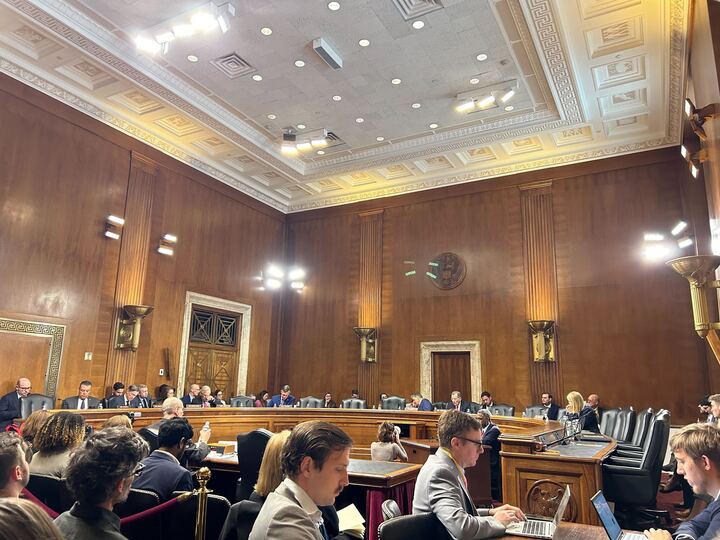WASHINGTON – Senate Republicans on Thursday attacked the Biden administration’s pause on reviewing liquefied natural gas export applications, saying it will harm the energy security of the U.S. and its allies, even as officials say the move will not prevent the U.S. from more than doubling its exports by 2030.
During a hearing before the Senate Energy and Natural Resources Committee, David Turk, deputy secretary of the Department of Energy, said this pause will not halt the eight terminals currently exporting LNG nor the five under construction.
The move, however, would keep the Department of Energy from assessing over a dozen pending project applications to export LNG, a gas used to heat homes and generate electricity until the review is completed.
“DOE has the responsibility to assess additional proposed exports using the most complete, the most updated and the most robust cost analysis possible,” Turk told lawmakers. “I would find it irresponsible if we weren’t taking a step back and undertaking this rigorous analysis.”
President Joe Biden’s announcement in late January of the pause cites environmental concerns, potential energy cost increases to Americans and health risks to communities that “disproportionately shoulder the burden of pollution from new export facilities.” The last time the DOE updated its analysis was 2018, when the country’s export capacity was less than a third of what it is now.
But several Republicans and some Democrats, like committee Chair Joe Manchin (D-W.Va.), criticized the decision, citing national security and global demand.
Calling Biden’s decision “political theater,” ranking member John Barrasso (R-Wyo.) said “the world needs and wants more American energy, not less.”
Republicans said the move could shift energy markets to competitors like Russia and Iran and reduce potential economic growth in the U.S.
“We need to be able to send a message to our friends and allies, you can actually trust the United States to be true to their word,” said Sen. Lisa Murkowski (R-Alaska).
Two groups interrupted the hearing to protest the use of LNG, which contributes to global warming, before being escorted out.
The U.S. had the world’s largest export capacity of LNG in 2023. Russia came in fourth, with around a third of the capacity of the U.S., and Iran did not make the top 10.
The pause does not affect exports to countries that have free trade agreements with the U.S., which constitute around 20 percent of the country’s total exports. It also exempts national security emergencies.
“The European Commission has said publicly that the pause will not have any short- or medium-term impact on EU security of supply,” Turk noted.
He added that U.S. LNG exports will continue to increase while Europe’s demand goes down.
Turk also said global LNG demand must fall 75% by 2050 in order to reach net zero emissions.
An NYU study found that the estimated climate costs of continuing to export LNG outweigh the economic benefits for American households.
“Under all scenarios evaluated, we found the gross climate damage greatly exceeded economic benefits,” said Minhong Xu, an economist who co-authored the study.
Charlie Riedl, executive director of the Center for LNG, a group that represents oil and gas companies, said future projects will benefit local economies by creating jobs and boosting revenue.
In an interview with Medill News Service, Manchin warned that workers could lose their jobs if the DOE does not extend contracts for existing facilities.
All 23 Republican attorneys general signed a letter Tuesday urging Biden and DOE to resume review of export applications, claiming the pause is unlawful, economically damaging and “detrimental to our national security.”
In a back and forth debate, Manchin said Biden “put the cart before the horse” by announcing the pause before discussing it with interested parties.
But Sen. Angus King (I-Maine) replied: “I think just the opposite,” adding that it was the Energy Department’s legal responsibility “to see that export projects are in the public interest, not in the interest of the oil and gas industry. Isn’t what you’re doing here – simply looking before we leap?”


